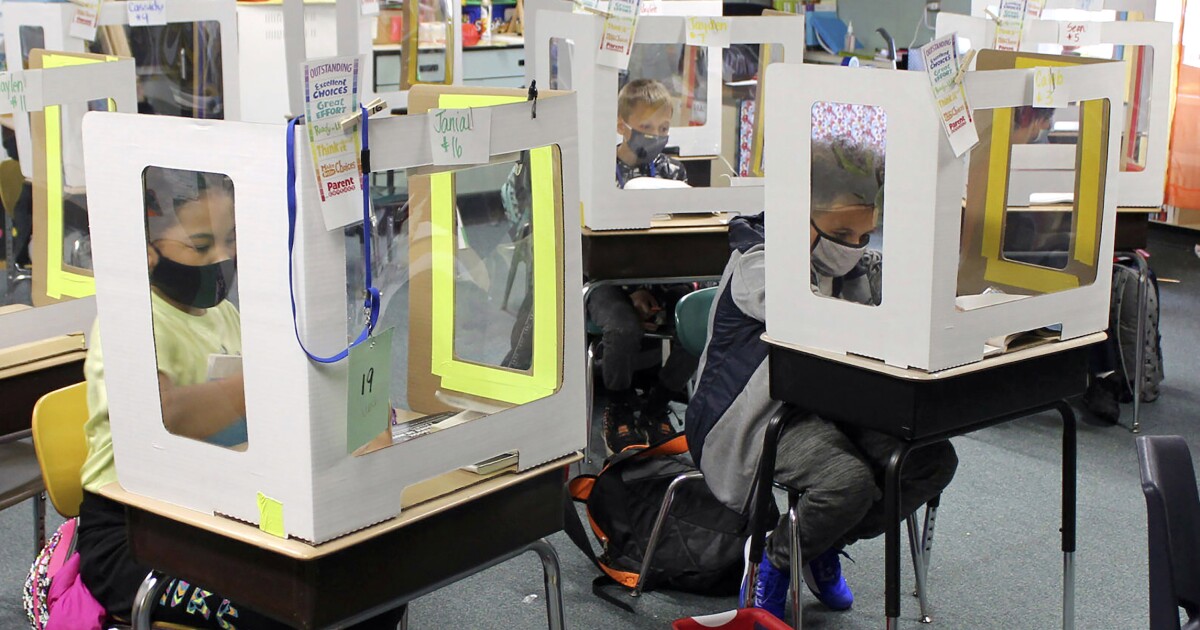

President Joe Biden had an enormous edge in 2020 with voters whose biggest concern was the coronavirus. But with some pandemic policies not aging well and the issue generally slipping down the list of voter worries, COVID-19 could become a drag for Democrats in the midterm elections.
Recently released data showed huge losses in reading and math scores during the years when many schools were closed, and a piece in the Atlantic calling for “pandemic amnesty” drew swift blowback from conservatives.
SEE IT: WHITE HOUSE DELETES TWEET AFTER BEING FACT-CHECKED BY TWITTER
“The Democrats own the COVID response, and most voters feel betrayed by how the government overreacted to a virus that 99.9 percent of the people capably survive,” said Republican strategist John Feehery. “This issue particularly energizes Republican base voters who care about liberty and swing voters who have been horrified at what our schools have done to children.”
Biden promised two years ago to “shut down the virus” upon taking office and won voters whose top issue was COVID-19 by 66 points. But the virus persisted after he entered the White House, and it didn’t prove a winning issue 12 months later. Gov. Glenn Youngkin (R-VA) won an upset over Democrat Terry McAuliffe in 2021 largely over education issues, including school closures and mask mandates.
Similarly, suburban women largely backed Biden’s White House bid but have shifted hard toward the GOP. Since August, Wall Street Journal polling found a 26 percentage point shift among suburban white women toward Republicans.
The disastrous results of school closures are acknowledged in the Atlantic piece calling for amnesty.
“There is an emerging (if not universal) consensus that schools in the U.S. were closed for too long,” wrote author Emily Oster. “The health risks of in-school spread were relatively low, whereas the costs to students’ well-being and educational progress were high.”
Randi Weingarten, president of the American Federation of Teachers, tweeted out the story along with the comment “I agree.” Many conservatives blame Weingarten in particular for extended school closures and are using the issue in campaigns.
“Parents are the primary stakeholders in their child’s education — not the failed teachers unions or the federal government,” reads a tweet from House GOPers. “House Republicans will demand accountability from the Biden admin for labeling concerned parents as domestic terrorists.”
The White House is trying to distance itself from school closures, pointing the finger back at Republicans for not supporting the $1.9 trillion American Rescue Plan that Democrats say was necessary to get students back into classrooms.
Democratic strategist Tom Cochran said the strategy is wise.
“Pandemic fatigue is unfortunately a real thing, and we’ve seen COVID understandably drop behind inflation, reproductive rights, and Ukraine as a priority for Americans,” said Cochran, a partner at 720 Strategies. “There’s a real risk of pushing undecided voters into the GOP camp with a continuation or increase in strict pandemic policies.”
There are still a lot of voters who say they’re concerned about the pandemic. A NewsNation poll released this week found that 60% of respondents said they’re either very or somewhat concerned about the virus. But few still identify it as their top priority, and those who do may worry about government overreach more than the disease itself.
A CBS News poll found that 72% of parents with school-age children worry about student learning declines and are split on whether Biden deserves credit or blame for his handling of the virus.
Biden has taken an evolving and sometimes contradictory stance on the pandemic in recent months. He announced a $500 billion student debt transfer that was based on the pandemic being an emergency. Just weeks later, he said on 60 Minutes that “the pandemic is over.” In October, Biden received his fifth COVID-19 shot and declared the disease a “global health emergency.”
CLICK HERE TO READ MORE FROM THE WASHINGTON EXAMINER
The pandemic is likely to keep playing out politically into the next election. Gov. Ron DeSantis (R-FL) was launched into the national presidential conversation largely due to his aggressive COVID-19 stance. Florida reopened schools in August 2020, whereas some big-city school systems didn’t reopen until a full year later.
DeSantis reminded voters of that during a debate with his Democratic challenger, Charlie Crist.
“I made sure you can earn a living,” he said. “I made sure you could operate your businesses. And I worked like heck to make sure we had all our kids in school in person five days a week.”






